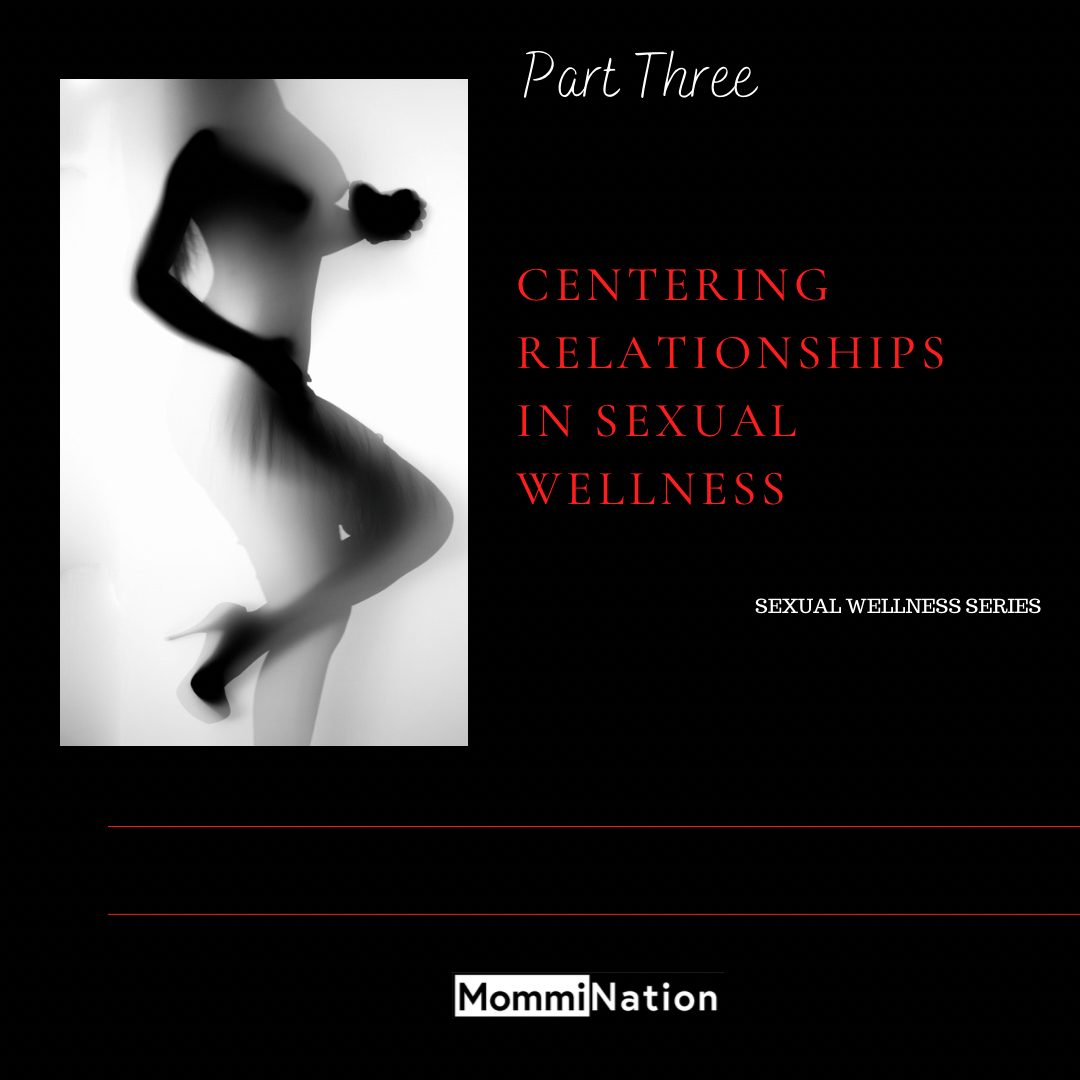For the month of February MommiNation concludes our conversations about love, sensuality, and sexuality with reproductive justice activists Brittany Brathwaite, MSW, MPH, and Kimberly Huggins, LSW, MPH, MEd. Ms. Brathwaite and Ms. Huggins are co-owners of Kimbritive, a sexual wellness platform for Black women. This time we talk about relationships as key to sexual wellness.
MommiNation: You have said that sexual wellness is, in part, about the power to define and shape relationships. Let’s start our conversation there.
BB: There’s two types of relationships in Black families: monogamy and cheating. That’s all you got! [Laughing] We educate people that actually there are several different relationship styles.
There are polyamorous relationships. There’s a plethora of options. We answer questions about
those so that we can move away from that dichotomy of monogamy and cheating.
MommiNation: Recently there were spotlights on Will Smith and Jada Pinkett Smith and their relationship decisions. I think they’re polyamorous. And, the immediate reaction for some people in the Black community is, “That’s freaky.” How do you destigmatize the range of relationships that human beings can have?
KH: I think the Will and Jada thing is funny because this works for them. They’ve been together for decades. They are vulnerable enough to share with each other that, actually, I would like a relationship with you that looks like this instead of what other people in society or religion or family have told me.
BB: Usually when people say, “I’m in a relationship” the default idea is you’re in a monogamous relationship. But, there’s a good number of people who don’t know they’re not in a monogamous relationship.
They’re in a non-consensual monogamous relationship where they’re monogamous, but the other people are not. And there’s a series of things that go along with that, like thinking, ‘I need to stop my partner from cheating.’
KH: But, you’re not going to be able to do that!
BB: Or, I need to be better, and I need to transform myself. But, if we live radically honest lives we can acknowledge that people may have other partners. Will and Jada are people who are willing to live in their truth. They could easily be on the front of Essence magazine for the celebration of Black love because they have been in a marriage for so long in a country that has a 50% divorce rate. But, that is not what we celebrate, we dig into who else they’re sleeping with.
MommiNation: How do you help women take on the tensions between religion and sexuality?
KH: In our workshops we stress that if abstinence is something that you’re choosing, that’s great, but that doesn’t excuse you from learning about your body and knowing about the things that you need to know before you have your first sexual experience.
So, if there are ideas that you have around sex and sexuality that are rooted in shame, or rooted in making you feel bad, you need to interrogate them. Ask yourself, what is that about? Is that something that is serving me or
something that is harming me? You get to be in relationship with your religion and your practices in that way that you feel good and safe.
BB: There’s a misconception that people like Kim and I either dismiss religion or we’re atheists. I went to Catholic school my entire life. But, I do believe that we have to be critical of any text or teaching.
There’s lots of sex in The Bible. Lots of people [in the Bible] are in polyamorous or polygamous relationships. There’s sex without permission. Kim and I talk about how women are portrayed in the Bible where they’re portrayed as infertile.
Meanwhile, their partners are like 98. It ain’t you! It’s not! Also, Mary was 14. She was a teen parent. There’s a whole conversation to be had there. So, heavily harping on The Word without actually thinking about where we are in
these current times can be really dangerous. And, to Kim’s point, we’re not telling you to act on something that goes against your religious values, but education is key.
KH: And, God made the clitoris for pleasure.
BB: It only has one function! It does nothing else. People have been studying trying to figure out what other things it can do. Its only job is pleasure.
KH: There are also sex educators whose background is in religion and who talk to women about their spiritual journeys. Sex and sexuality are part of the conversation that you have with yourself and with God. Our aim is to be able to bring those voices into this platform.
Mommination: How does Kimbritive support the journeys of trans-women, queer-identified women, and gender non-conforming women?
BB: Everybody gets this education, and we don’t make assumptions. A lot of times that requires changing the tools we use. Like, we understand that some people don’t identify this area as a breast. For some folks this is a chest. They think about chest feeding instead of breastfeeding.
And, we often hear people say women are statistically less likely to orgasm. But, there’s a caveat there. Queer women don’t have that problem. It is heterosexual women who have the issue of orgasming during heterosexual sex. So, bringing that information to folks, and actually lifting up the experiences of women with different sexualities actually makes the work richer. We decenter heteronormativity because it doesn’t serve us.
MommiNation: What services does Kimbritive offer?
BB: We have a lot of services. Our newest thing that we’re launching is our digital platform. Black women can access that platform as a way to interact with our work and get adult sex education and learn about tools, tips, and practices.
One way that people meet Kimbritive is through workshops at a school or a university. Or, if you and your friends want sex education as a part of your birthday party, we’ll plan a pleasure party for you where we introduce people to
different tools and things like that.
Then our final thing is we train organizations to adopt some of our own principles and values in their work. So, people hire us to come in and talk about reproductive justice. We are very versed in the history of Black women’s sexual and reproductive health, especially in the United States. When you have that sort of background you make
different choices about how you speak about things.
MommiNation: What’s an example of that?
BB: So, with long-acting reversible contraceptives like an IUD, when you meet Kimbritive talking about that it’s going to sound really different because we know that people are not trusting of this device because we have a long history of reproductive coercion and violence.
But, there are still benefits. And we support people talking about that. We have a free newsletter called Salt that is mostly monthly, that anybody can join and get lots of information. It’s free to join.
KH: I was going to add a little bit more about the wellness space that we are creating. People can access a doula when they’re family planning or they experience loss, or they had an abortion. We want you to have access to doulas for the things you need.
MommiNation: Who should be calling you?
KH: My gut first answer is always going to be the medical community, because part of our work is to help Black women to be able to advocate for themselves in the doctor’s office.
MommiNation: And, I can imagine sororities, not just sororities that are with the 18- to 22-year-old traditional students, but legacy sorority members who are like 40, 50, 60, 70 years old. And, senior homes where there are women who are sexually active still who are in their 70s and 80s.
BB: Yes. And, if you have a book club it’d be great to bring someone like us in to support you. If something felt pleasurable and you’re interested in having a conversation about how to practice this in your own life, we could support that.
______
Bio: Kimberly Huggins, LSW, MPH, MEd is a licensed social worker, a therapist, and a sex
educator. Brittany Brathwaite, MSW, MPH is a Public Health Social Worker, reproductive
justice activist, and sex educator. Kimbritive is a growing digital platform of educators, wellness
practitioners, and doulas supporting Black women their sexual wellness journey providing
content community and expert care where we feel seen, heard and celebrated.

This is the final article in our three-part series. Please be sure to catch up on the rest of the series.








Leave a Reply